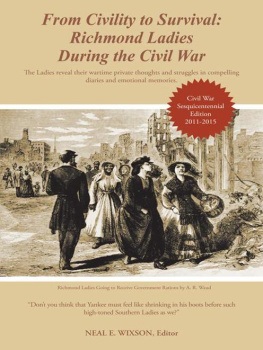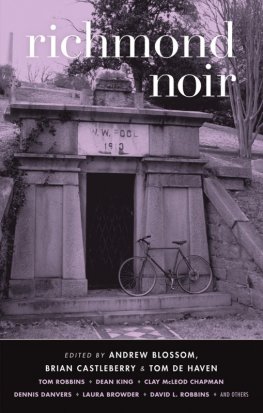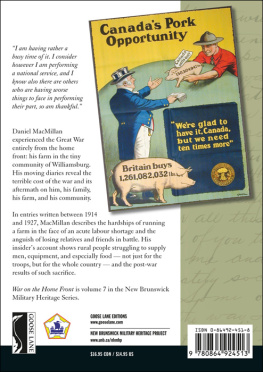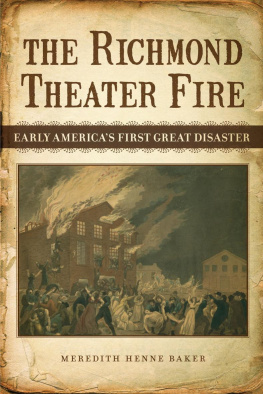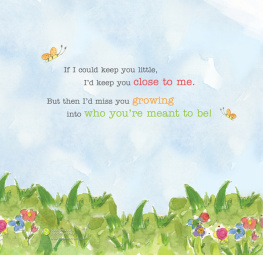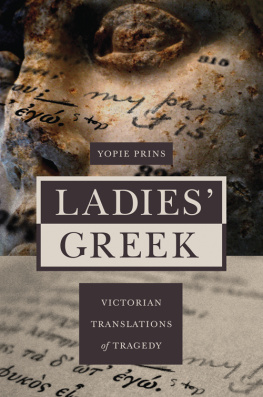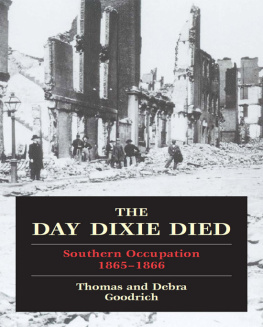Neal E. Wixson - From Civility to Survival: Richmond Ladies During the Civil War: The Ladies Reveal Their Wartime Private Thoughts and Struggles in Compelling Diaries and Emotional Memories.
Here you can read online Neal E. Wixson - From Civility to Survival: Richmond Ladies During the Civil War: The Ladies Reveal Their Wartime Private Thoughts and Struggles in Compelling Diaries and Emotional Memories. full text of the book (entire story) in english for free. Download pdf and epub, get meaning, cover and reviews about this ebook. year: 2012, publisher: iUniverse, genre: Non-fiction. Description of the work, (preface) as well as reviews are available. Best literature library LitArk.com created for fans of good reading and offers a wide selection of genres:
Romance novel
Science fiction
Adventure
Detective
Science
History
Home and family
Prose
Art
Politics
Computer
Non-fiction
Religion
Business
Children
Humor
Choose a favorite category and find really read worthwhile books. Enjoy immersion in the world of imagination, feel the emotions of the characters or learn something new for yourself, make an fascinating discovery.
- Book:From Civility to Survival: Richmond Ladies During the Civil War: The Ladies Reveal Their Wartime Private Thoughts and Struggles in Compelling Diaries and Emotional Memories.
- Author:
- Publisher:iUniverse
- Genre:
- Year:2012
- Rating:5 / 5
- Favourites:Add to favourites
- Your mark:
From Civility to Survival: Richmond Ladies During the Civil War: The Ladies Reveal Their Wartime Private Thoughts and Struggles in Compelling Diaries and Emotional Memories.: summary, description and annotation
We offer to read an annotation, description, summary or preface (depends on what the author of the book "From Civility to Survival: Richmond Ladies During the Civil War: The Ladies Reveal Their Wartime Private Thoughts and Struggles in Compelling Diaries and Emotional Memories." wrote himself). If you haven't found the necessary information about the book — write in the comments, we will try to find it.
Motivated by their patriotism, the Richmond Ladies were willing to make the necessary sacrifices for the Southern cause. Many sent their husbands and sons to fight for the glory of the South. However, as the war progressed, their sacrifices became harder and harder to bear. They faced shortages of food, struggled to find adequate housing, and, in some cases, endured the ultimate price of losing husbands, sons, and close relatives. As Richmond was evacuated, they braced themselves for military occupation and reconstruction. With the loss of their slaves, wealth, social standing, and homes, they entered into a new world order with few familiar aspects. Through their diaries and recollections, their story of courage and commitment to survive in an ever changing world is told.
Neal Wixson selected detailed, poignant and sentimental excerpts from some of the most important accounts of Richmond during the Civil War which succeeds in capturing much of the flavor of the Confederate capital as seen through womens eyes.
Michael B. Chesson, Professor of History, The American College of History and Legal
Studies and author of several books including Richmond after the War 1865-1890
A vivid account of wartime Richmond as told by women who endured its physical and emotional hardships.
Carol Sheriff , Professor of History, College of William & Mary and author of The
Artificial River and of co-author of A People at War
By giving voice to the ladies who lived in Richmond during the Civil War, Neal Wixson offers a chorus of their faith and perseverance in enduring deprivations and sacrifice.
Will Molineux, editor of A Young Virginia Boatman Navigates the Civil War
Neal E. Wixson: author's other books
Who wrote From Civility to Survival: Richmond Ladies During the Civil War: The Ladies Reveal Their Wartime Private Thoughts and Struggles in Compelling Diaries and Emotional Memories.? Find out the surname, the name of the author of the book and a list of all author's works by series.

